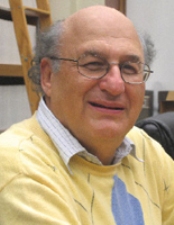Feb 26 2014
Professor Mikhail Shifman, recent Pomeranchuk prize winner, says that particle physicists are experiencing a crucial time. And he ought to know. Shifman has written several books on the history of elementary particle physics. "We are at a crossroads, we will go to the left or to the right or nowhere" Shifman says, referring to the fact that supersymmetry, the theory that states that there are superpartners for every known particle, has not yet been discovered at the Large Hadron Collider.
 Mikhail Shifman. Credit: Alex Schumann
Mikhail Shifman. Credit: Alex Schumann
While Shifman’s research has focused on applications of supersymmery or SUSY, in strong coupling problems, --- an area which will not go away just because SUSY hasn’t been observed in nature -- there are a large number of high energy theorists who’ve studied SUSY as a natural phenomenon who are so far disappointed by the outcome. "Of course I hope for some positive outcome, the discovery of SUSY or something else at the LHC. Accelerators can find unexpected things. That is how the charm quark was discovered, in an accelerator built for a completely different purpose. Maybe nature has prepared some surprises for us."
Despite these disappointments, Shifman is taking a long view of the situation. "I still remember the previous time of this type: the last year of my undergrad studies in 1969 at ITEP (Moscow). We had then three years of uncertainty – from 69 till 72 – and then three years of triumph and discovery." After the discovery of the Standard Model and QCD in 1972-1974 there was a complete revolution in high energy physics. "It was a very fruitful time for theory because there were so many new ideas." Shifman says that research in particle theory stalled again at the end of 1980s and we’ve been waiting since then for the start of LHC.
Current developments at the LHC mean that if SUSY exists in nature, it is more contrived than physicists thought and doesn’t follow the minimal pattern that they thought. Without any hint from experiment, they don’t know what to change to make their theories more realistic and relevant to nature. Shifman says these next few years after the LHC is reopened after upgrades, will be a very crucial time: either some non-minimal SUSY will be discovered or something unexpected. "It’s clear that if the next generation of particle accelerator is to be built, it will have to be an international endeavor, it will take 15-20 years or more, and only the next generation of physicists will get to enjoy the outcome."
In addition to his research on applications of supersymmetry in non-Abelian field theory, Shifman has written several books on the history of physics. His most recent volume called Under the Spell of Landau is a compendium of recollections by students and colleagues of Lev Landau, the Russian physicist who founded the Landau School in Moscow. Shifman was inspired to put the book together on the death of his colleague Anatoly Larkin who belonged to the Landau circle. Though Larkin had been a hugely influential physicist with numerous prominent students in the field of condensed matter physics, Shifman was surprised to see that not much had been written about him. Upon further reflection, he decided to expand the scope of book to include Landau and his many students. Landau was a “great Universalist” meaning that he contributed to every area of physics. Shifman was not a student of Landau’s but a student of one of his students. “I am a grandson, in that sense,” he jokes.
Mikhail Shifman continues to look back at the history of particle physics and to look forward to new research. The discovery of the Higgs closed the standard model, he says. “It was a great discovery, but it is the end of something. Now we hope for some new beginnings,” he says.